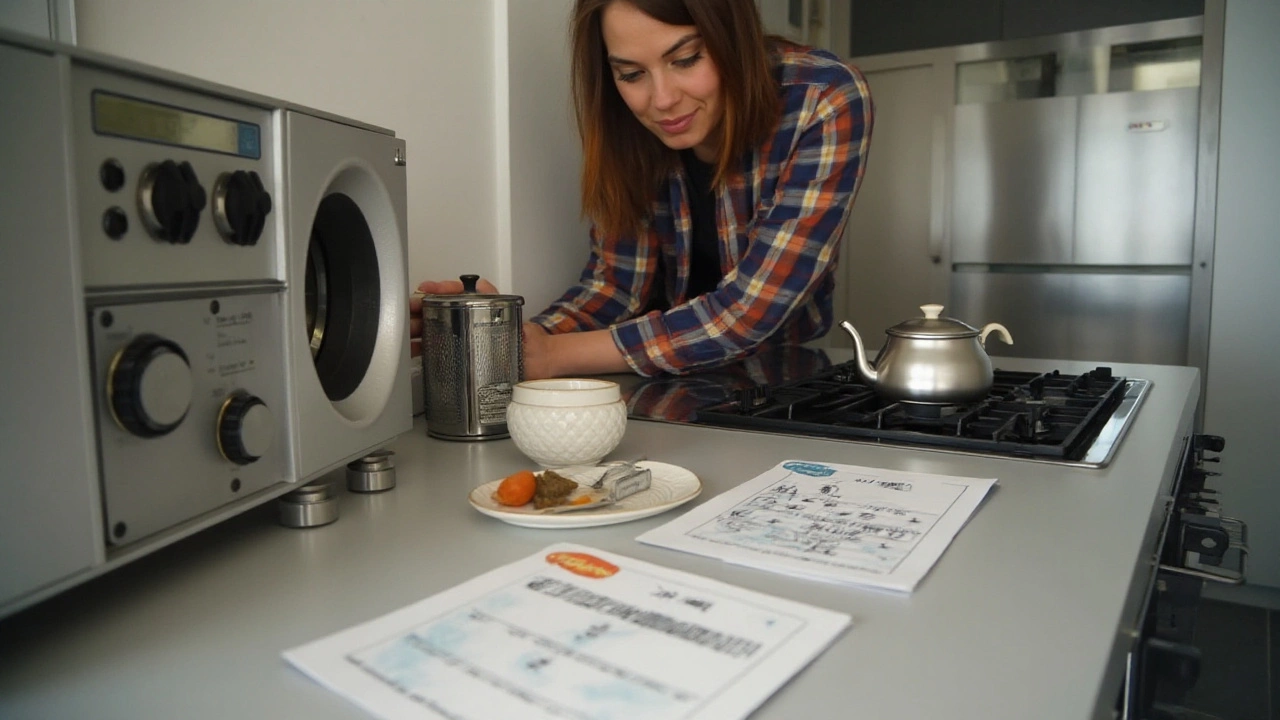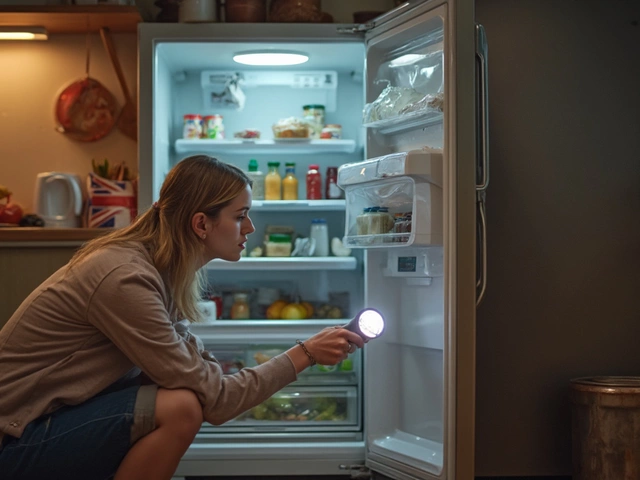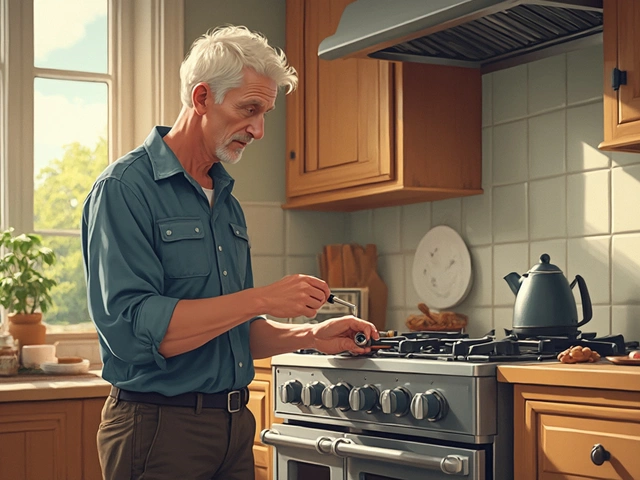There's a particular chill in the air when a freezer starts acting up—it sends shivers down your spine just thinking about the problems it could cause. One of the most critical components of this trusty appliance is the compressor, which, when falters, can leave you pondering whether it's worth the effort to get it replaced.
Before making any decisions, it's important to weigh the costs, the age of the appliance, and the signs indicating a compressor might be on its way out. In this article, we're going to walk through everything you need to consider, giving you the tools to figure out if replacing that compressor makes financial and practical sense for your household.
- Understanding the Freezer Compressor
- Signs of a Failing Compressor
- Cost Implications of Replacement
- Age and Efficiency of Your Freezer
- DIY or Professional Assistance
- Alternative Solutions and Preventive Measures
Understanding the Freezer Compressor
Understanding the humble freezer compressor is akin to discovering the beating heart of your trusty chilling companion. This metallic marvel is tasked with an incredible job, the magical transformation of low-pressure gas into a high-pressure state. It acts as the pulse that circulates refrigerant, the lifeblood that courses through your freezer, ensuring your ice cream remains creamy, not soupy. It's a relentless workhorse, typically nestled at the back or the bottom, unobtrusively performing its duties to maintain the balance of coolness.
Often misunderstood or forgotten, the compressor's operation is straightforward yet brilliant. The process begins with pulling in the refrigerant gas from the evaporator coils where heat absorption takes place. It then compresses this gas, raising its temperature and pressure. Once compressed, this hot and pressurized gas moves to the condenser coils, where it dissipates heat into the surrounding environment, transforming back into a cooler liquid state. This loop ensures that your freezer stays icy cold at all times. If those coils could talk, they'd give Sonnet 18 a run for its money as they cool down that hot mess.
It's worth noting that freezers across a range of homes or eateries take advantage of these compressors. They may vary slightly from model to model, but the basic principle remains the same. The inner workings might seem like a formidable puzzle at first glance, but once you peel back the layers, it’s a symphony of engineering precision. Let's not forget the manufacturers who, by continuously refining this technology, keep your ice packs brisk and berry sorbets stiffened.
Did you know many modern freezer compressors are equipped with energy-efficient features, contributing less to your electricity bill while being kinder to the globe? According to the ACEEE’s report on home appliances, significant strides have been made, achieving over 25% reduction in energy consumption compared to older models. Now that's a hard fact worth chilling to.
Faced with this knowledge, it's easy to see why choosing to repair or replace a malfunctioning compressor isn't just about practicality; it's about ensuring the continuance of this intricate balance. Keeping it in prime condition isn't merely a maintenance task—it's an art in preserving both food and energy investment. As we delve deeper into the signs and costs related to compressor troubles, remember that this piece of machinery holds the key to your freezer's longevity and efficiency. Recognizing its value might just keep you from having to eat that tub of ice cream before it melts!
Signs of a Failing Compressor
A freezer is an essential part of modern living, keeping our frozen goods preserved until we're ready to use them. However, the heart of this appliance—the freezer compressor—can sometimes signal trouble before it stops completely. Recognizing these signs early may save both time and money in the long run. One common indicator is the freezer not maintaining a consistent temperature, leading to ice cream that's consistently soft or meats that seem a bit thawed around the edges. This could suggest the compressor is struggling to do its job. But what else should you watch out for?
If you've recently noticed your freezer making odd noises, it might be time to listen more closely. A healthy compressor should hum quietly. If you start hearing clicking, humming, or even a clunking sound, it's imperative to investigate immediately. These noises often indicate that the compressor is cycling on and off more frequently than it should be, a potential signal that it's overheating or experiencing electrical issues. Michael Sanford from Appliance Repair Now says,
"Ignoring unusual sounds from your freezer is like choosing to drive a car while it’s making strange noises; it's only a matter of time before a small problem becomes a costly disaster."
Another telltale sign can be found through touch. If the exterior of the freezer feels unusually warm, especially at the base where the compressor is located, it could mean the compressor is having difficulty dissipating heat. A functioning freezer compressor should maintain a balance in temperature; excess heat spotlights a potential problem. Similarly, if you notice frost buildup inside your freezer, it could suggest that the compressor isn't compressing the refrigerant correctly. These systems rely on a specific cycle to keep everything cold and frost-free, and when disrupted, frost can become a frequent guest.
Lastly, consider your energy bills as a silent messenger. A faulty compressor may cause the freezer to work overtime, leading to a noticeable increase in energy consumption—a heads-up that something isn't right. Data from the Home Appliance Energy Usage Study show that a well-functioning compressor runs efficiently, while one nearing its end can ramp up energy costs by 15-20%. Keeping an eye on your energy bills can thus provide an important clue regarding your compressor's health.
By recognizing these signs, you can decide whether repairing the current compressor makes sense or if it might be time to explore other avenues. This proactive approach not only enhances the lifespan of your freezer but also ensures the safety and quality of the food it stores.

Cost Implications of Replacement
When your freezer's compressor starts wheezing and sputtering out its last cold breath, the question of cost can often send a chill through your budget. Replacing a freezer compressor doesn't just affect your immediate expenses; it is a decision that can reach far into future savings or expenditures. On average, replacing a compressor can range between $200 to $500, depending on the model and the labor costs in your area. This isn't pocket change, and it's important to weigh this against the cost of a brand-new freezer, which can start at around $700 and go up significantly based on extras and energy efficiency.
One key aspect to consider is the age of your appliance. Most freezers are designed to last roughly 10 to 20 years, and if your freezer is on the older end of that spectrum, replacing the entire unit might be more cost-efficient in the long run. You see, newer models are often more energy-efficient, which could mean greater savings in your electricity bill over time. A new unit may also come with warranties and updated technologies that a simple compressor replacement wouldn't address. However, if your freezer is relatively new, the warranty might actually cover compressor issues, significantly reducing or eliminating the replacement cost altogether.
"In the realm of appliance repair, understanding the cost-benefit ratio is key," says Martha Tilson, a specialist in household appliances with over 20 years of experience. "Assessing the true value of repair versus replacement requires a discerning look at both present and future implications for your wallet."
Taking a deeper dive into the economics, consider the energy consumption rates of older freezer models versus contemporary ones. An outdated compressor might be guzzling more power than necessary. Should the electrical savings from a new model dictate the finances? Let's assume a new model saves you $10 monthly on energy bills. Multiply that by a year, and you're looking at $120 annual savings, which begins to offset a portion of your purchase cost. Not unimportant is the ecological footprint—a newer, energy-efficient freezer means you are not just investing in your household, but also making a greener choice.
Identifying tangible and intangible costs is another part of the puzzle. The inconvenience of part replacement should not be underestimated. Getting the repair done often means scheduling visits, waiting for parts, and perhaps some freezer downtime—all of which can impact your lifestyle. In some cases, homeowners have had to endure spoiled groceries, which is an additional unconsidered cost. On the flip side, actively engaging in appliance repair rather than replacement can be an opportunity to support local repair businesses and contribute towards reducing landfill waste.
Age and Efficiency of Your Freezer
The age and efficiency of your freezer are paramount considerations when deciding on a compressor replacement. A new, state-of-the-art unit can sound tempting, boasting advanced technology and energy-saving features. However, nostalgia and reliability might prompt you to hold on to a trusty old model. If your freezer is relatively new, say under five years old, it likely still has the chops to serve you well with a compressor replacement. Modern appliances are engineered to last, offering greater efficiency and performance. It's common for compressors in newer models to fail only if they've been pushed to their limits, which often means they've undergone some serious workload.
On the flip side, if your freezer is over a decade old, you might want to weigh the potential benefits of replacing it entirely. Older freezers, like those quaint models your grandparents probably owned, were built with durability in mind but are usually energy hogs by today's standards. They often use up to twice as much electricity as their modern counterparts. The Department of Energy notes that older appliances are often less efficient, which can have a surprising impact on utility bills. Considering these factors is crucial in deciding whether a new compressor would bring back your freezer to its former glory or if you’d end up merely extending the inevitable.
"A penny saved on energy is a penny earned," says Jane Thomas, a well-respected appliance technician with over 20 years of experience. She elaborates that replacing components in significantly aged units often leads to diminishing returns, where the cost savings from electricity and upkeep are surprisingly dwarfed by the expenses of repeated repairs.
When thinking about efficiency, consider using the Energy Star rating as a benchmark. Energy Star-certified freezers can reduce energy utilization by up to 15%, which in the long run can be more economical than running an old energy-gulping buzz box. You might also want to sit down with a calculator and crunch some numbers—a good budgeting exercise to assess whether a one-time hefty upfront cost for a new freezer might save you more cash compared to fixing up an old friend.
Calculating the Cost of Efficiency
Use online energy calculators to precisely determine the efficiency of your current model and the potential savings with newer ones. Sometimes even slight improvements in efficiency can lead to significant financial advantages over the life of the appliance. Here is a simplified table to give you a sense of typical annual savings:| Appliance Age | Efficiency Gain | Annual Savings |
|---|---|---|
| 10+ years | 20% | $50-$100 |
| 5-10 years | 10% | $25-$50 |
| Less than 5 years | 5% | $10-$25 |
In essence, replace that compressor if the efficiency gains justify the expense and complement your environmental concerns. Otherwise, weighing the overall energy consumption for older units may prompt a trip to the nearest appliance store for a fresh start.

DIY or Professional Assistance
When your freezer's compressor shows signs of trouble, the question of attempting a DIY repair or calling in a professional hinges on a few critical aspects. First, consider the complexity of the task. The compressor acts as the heart of your freezer, circulating refrigerant to keep your food at safe temperatures. Replacing it requires not only technical expertise but also specific tools like a refrigerant recovery machine and manifold gauges. Lacking access to these means running the risk of mishandling refrigerant, which has environmental and safety implications.
Moreover, a mistake during a DIY compressor replacement can lead to further freezer damage or void the warranty. If you're thinking about tackling this on your own, DIY videos and guides make it look doable, but the devil is in the details. Even slight errors can cause bigger headaches down the line, turning a small mishap into a larger repair or replacement.
On the other side, hiring a professional provides not only peace of mind but also a level of expertise that can save time and future costs. Certified technicians come equipped with the necessary tools and experience to ensure a smooth replacement process. According to a survey in Appliance Magazine, 65% of homeowners who hired professionals for compressor replacement reported satisfaction with service quality and longevity of repairs.
"A skilled technician is not just fixing a machine; they're ensuring a household stays in order," says James Kliner, a renowned appliance repair specialist.
Cost considerations also play a pivotal role in the decision-making process. While professional services could cost you anywhere between $200 and $500 for a compressor replacement, DIY could cut expenses, primarily if you already have some tools and parts. Yet, it's crucial to weigh these savings against potential long-term costs from improper installations. If your freezer is still relatively new and under warranty, a DIY approach could nullify any service agreements or future claims. That's a crucial aspect to keep in mind as it can significantly influence your decision.
Ultimately, deciding between DIY or professional help involves assessing the risk factors, personal skills, and the specific condition of your appliance. It may be worth considering at least getting an estimate from a professional before making a final choice. This way, you ensure your decision not only fixes the problem but secures the longevity of your freezer, maintaining its crucial role in your home without unnecessary risks.
Alternative Solutions and Preventive Measures
When it comes to addressing issues with your freezer compressor, sometimes thinking outside the box can lead to the best outcomes. Before plunging into the deep end with a replacement, it might be worthwhile to explore what alternative solutions you have at your disposal. A wealth of knowledge often gets passed down by appliance repair professionals who point out that sometimes a simple fix can work wonders. For example, checking the thermostatic controls inside your freezer can pinpoint the root of a problem that you initially assumed was compressor-related.
Preventive measures can save you a tremendous amount of hassle down the road. Regular maintenance practices like cleaning the condenser coils every six months can significantly prolong the life of your freezer, reducing the chances of any freezer malfunction occurring due to an overwhelmed compressor. Make sure your freezer is always on even footing, as tilted positioning can lead to increased strain on the entire system. Moreover, regularly defrosting your appliance is another simple yet effective way to keep it running smoothly.
By integrating forward-thinking solutions, sometimes you can even enhance the efficiency of your freezer with modern tech upgrades. Energy-efficient components are becoming increasingly accessible, and they offer a sustainable route to maintaining your appliance's functionality. If upgrading isn't in the cards presently, perhaps ensuring better airflow around your unit might do the trick; proper ventilation helps avoid compressor burnout by allowing the appliance to breathe a bit.
On the cutting edge, some homeowners have even turned to innovative gadgetry, such as smart sensors that monitor internal temperatures and send alerts to your phone if something seems amiss. These predictive measures help keep track of potential problems before they escalate. A survey conducted by the Appliance Repair Association revealed that about 65% of appliance breakdowns are preventable through vigilant maintenance and timely intervention.
"An ounce of prevention is worth a pound of cure," states renowned appliance expert Karen Williams, emphasizing the importance of addressing minor issues promptly before they turn into costly repairs.
In weighing these alternatives, bear in mind the specific requirements of your home and lifestyle. Beyond replacement, adjusting daily habits like how often you open and close the freezer door can help reduce the compressor's workload, adding extra years to your appliance's life. This combination of alternative solutions and preventive measures not only enhances performance but also ensures your trusty appliance remains a reliable fixture in your household.




